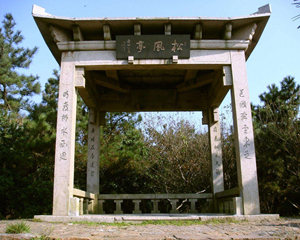《记游松风亭》是北宋文学家苏轼贬居广东惠州时所作的一篇小品文,记叙了作者游松风亭路途中的小事及感想。作者在谪居生涯中常常苦中作乐,信步山野中排遣愁怀,领悟自然玄机。此次登松风亭未遂,却再次觉悟到“随遇而安”的生活态度,表现了作者为人坦诚、天真、乐观豁达的一面。全文文字简炼,意味深永,顿挫有致。

苏轼·《记游松风亭》
余尝寓居惠州嘉佑寺,纵步松风亭下。足力疲乏,思欲就林止息。望亭宇尚在木末,意谓是如何得到?良久,忽曰:“此间有甚么歇不得处!”由是如挂勾之鱼,忽得解脱。若人悟此,虽兵阵相接,鼓声如雷霆,进则死敌,退则死法,当恁么时,也不妨熟歇。
On Visiting Pine-Wind Pavilion1
Su Shi
I once took up lodgings at Jiayou Temple2 in Huizhou. One day I was taking a brisk walk under Pine-Wind Pavilion3 when my legs gave way under me. I had a strong urge to stop and rest there and then. Gazing at the pavilion still way up above the tip of trees, I thought how I could ever get there. A long time after this, I suddenly said to myself, “What’s stopping me from taking a rest here and now?” No sooner said than I felt like a fish having shaken free of a hook. If a person could be made to realize what I was aware of then, nothing could stop him from taking a good break even when a war was going on between two armies with drums thundering overhead and when going forward would mean death from the enemy’s swords and retracing one’s steps, death by law.
1. This essay was written in the 1st year of the Shaosheng reign (1094) when Su Shi was further banished to Huizhou.
2. Jiayou Temple: located at the south side of White Crane Peak in the southern bank of the Dongjiang River in Huizhou (today’s Huiyang, Guangdong Province).
3. Pine-Wind Pavilion was in the vicinity of Jiayou Temple.
更多精品翻译素材,敬请关注可可英语。












